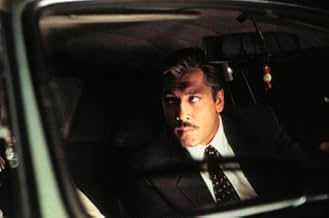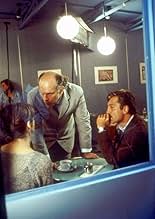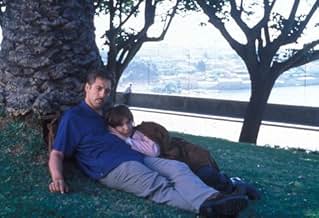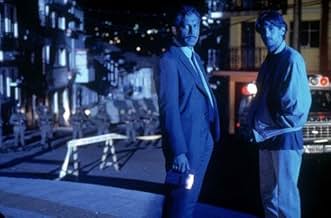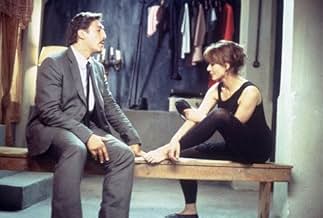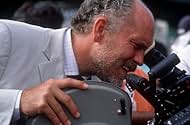Un détective de police dans un pays d'Amérique du Sud se consacre à la traque d'un chef de guérilla révolutionnaire.Un détective de police dans un pays d'Amérique du Sud se consacre à la traque d'un chef de guérilla révolutionnaire.Un détective de police dans un pays d'Amérique du Sud se consacre à la traque d'un chef de guérilla révolutionnaire.
- Prix
- 1 victoire et 3 nominations au total
Histoire
Le saviez-vous
- AnecdotesThe story is inspired by the Maoist insurgency in Peru known as the Shining Path. Its leader Abimael Guzmán, who was known by the nom de guerre President Gonzalo, was captured in an apartment above a ballet studio in the capital city of Lima in 1992. The ballet teacher Yolanda was based on Maritza Garrido Lecca, the woman in whose apartment Guzmán was found. Bardem's character was inspired by Benedicto Jimenez and Gen. Antonio Ketin Vidal, the leading figures responsible for Guzmán's capture.
- GaffesWhen Sucre & Llosa arrest the young woman in orange, she has been handcuffed to the ceiling of the car. But then en route, soldiers simply drag her out of the backseat. No handcuff keys. No bolt cutters.
- Citations
Agustín Rejas: I'd like to have a list of staff with access to the President's chambers.
Calderón: Luckily there are only two of them. The first is named 'Fuck', the second is named 'Off'.
- Générique farfeluThe producers would like to thank ... the residents of Narcisos Street ...
- ConnexionsFeatured in Revealing 'The Dancer Upstairs' (2003)
- Bandes originalesViagens Interditas
(1995)
Written by Pedro Malgheas (as Pedro Ayres) and Rodrigo Leão
Performed by Madredeus
Licensed by Dpte. de Productos Especiales de
(p) EMI Odean, S.A., Madrid, Spain, 2001 exclusive rights holder
Commentaire en vedette
I suppose this could be described as an off-Hollywood detective story with political overtones. It is based on a book by Nicholas Shakespeare (a part-time Australian) who has in turn loosely based his story on the rise and fall of the `Shining Path' or Sendero Luminoso insurgency in Peru (1980-1995). As rendered on film (Shakespeare also wrote the screenplay), we have an immensely likable policemen, Rejas, played to perfection by Javier Bardem, literally searching through the rubbish to find the shadowy Ezequiel, leader of a movement with a fine record of atrocities, but no program or real philosophy.
Nicholas, alas, is no Shakespeare, and the film becomes very slow in parts, though there are plenty of dramatic moments and some crisp editing. Bardem gets good support from some of the other actors such as Juan Diego Botto who plays his sidekick Sucre and Laura Morante as Yolanda the enigmatic ballet teacher he becomes involved with. Most of the cast are Spanish but the prodution was filmed in English, which has created an intermittent audibility problem. The film is also beautifully shot, the locations in Ecuador and Oporto, Portugal, being used to great advantage.
While the film succeeds quite well as a detective story it telegraphs too many punches to work as a thriller. However it's the politics that really let it down. Clearly, we have a not very nice, if elected, government under attack, and it's almost inevitable that the even more not very nice Army is going to step in. Against who? People who load up dogs with dynamite and send them in to crowded marketplaces. People who send in 10 year olds into village cafes to blow up themselves along with some local notables. The explanation for this comes only in one-liners such as `I am already dead, I live only for the revolution.' When Ezequiel, the former philosophy lecturer is finally captured, all he can say is `You cannot capture this ` (tapping his forehead). `We are already part of history.' Surely there is a better explanation for `Shining Path' than this. My own theory is that it is a rather nasty combination of French post-modern philosophy (Derrida, Foucault etc) mixed up with Marxism and Maoism and served up to people with not much to lose. If you are already dead you might as well die for the revolution. It's either that or slave for the whites.
Actually, `Shining Path' had some competition in the shape of Tupac Amaru, who captured the Japanese Embassy in Lima and held 70 or so people hostage for over 4 months in 1996-97, until being overwhelmed by Peruvian commandos who tunnelled in beneath them. None of the guerrillas survived. By the time I visited Lima and the Cuzco area in late 2000 all was quiet on the revolutionary front, though President Fujimori, hero of the embassy siege, despite having won a recent election was on his way out. I haven't read it yet, but I'm told Gustavo Gorriti's `The Shining Path: A History of the Millenarian War in Peru' is a good history of the era.
Maybe it's asking too much for political explanations, though the director clearly wants the film to be compared with Costa-Gravas' excellent `State of Siege' (which is shown briefly at one point and provides a vital clue as to Ezequiel's location). As to the direction, Malkovich seems a little uncertain whether he is making a thriller or something more reflective but he has a good sense of dramatic timing and a good visual sense. Perhaps more attention to the editing would have sharpened up the mood.
Nicholas, alas, is no Shakespeare, and the film becomes very slow in parts, though there are plenty of dramatic moments and some crisp editing. Bardem gets good support from some of the other actors such as Juan Diego Botto who plays his sidekick Sucre and Laura Morante as Yolanda the enigmatic ballet teacher he becomes involved with. Most of the cast are Spanish but the prodution was filmed in English, which has created an intermittent audibility problem. The film is also beautifully shot, the locations in Ecuador and Oporto, Portugal, being used to great advantage.
While the film succeeds quite well as a detective story it telegraphs too many punches to work as a thriller. However it's the politics that really let it down. Clearly, we have a not very nice, if elected, government under attack, and it's almost inevitable that the even more not very nice Army is going to step in. Against who? People who load up dogs with dynamite and send them in to crowded marketplaces. People who send in 10 year olds into village cafes to blow up themselves along with some local notables. The explanation for this comes only in one-liners such as `I am already dead, I live only for the revolution.' When Ezequiel, the former philosophy lecturer is finally captured, all he can say is `You cannot capture this ` (tapping his forehead). `We are already part of history.' Surely there is a better explanation for `Shining Path' than this. My own theory is that it is a rather nasty combination of French post-modern philosophy (Derrida, Foucault etc) mixed up with Marxism and Maoism and served up to people with not much to lose. If you are already dead you might as well die for the revolution. It's either that or slave for the whites.
Actually, `Shining Path' had some competition in the shape of Tupac Amaru, who captured the Japanese Embassy in Lima and held 70 or so people hostage for over 4 months in 1996-97, until being overwhelmed by Peruvian commandos who tunnelled in beneath them. None of the guerrillas survived. By the time I visited Lima and the Cuzco area in late 2000 all was quiet on the revolutionary front, though President Fujimori, hero of the embassy siege, despite having won a recent election was on his way out. I haven't read it yet, but I'm told Gustavo Gorriti's `The Shining Path: A History of the Millenarian War in Peru' is a good history of the era.
Maybe it's asking too much for political explanations, though the director clearly wants the film to be compared with Costa-Gravas' excellent `State of Siege' (which is shown briefly at one point and provides a vital clue as to Ezequiel's location). As to the direction, Malkovich seems a little uncertain whether he is making a thriller or something more reflective but he has a good sense of dramatic timing and a good visual sense. Perhaps more attention to the editing would have sharpened up the mood.
- Philby-3
- 4 juill. 2003
- Lien permanent
Meilleurs choix
Connectez-vous pour évaluer et surveiller les recommandations personnalisées
- How long is The Dancer Upstairs?Propulsé par Alexa
Détails
Box-office
- Brut – États-Unis et Canada
- 2 377 348 $ US
- Fin de semaine d'ouverture – États-Unis et Canada
- 106 142 $ US
- 4 mai 2003
- Brut – à l'échelle mondiale
- 5 227 348 $ US
- Durée2 heures 12 minutes
- Couleur
- Mixage
- Rapport de forme
- 1.85 : 1
Contribuer à cette page
Suggérer une modification ou ajouter du contenu manquant

Lacune principale
By what name was La danse de l'oubli (2002) officially released in Canada in English?
Répondre


